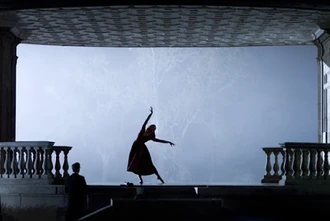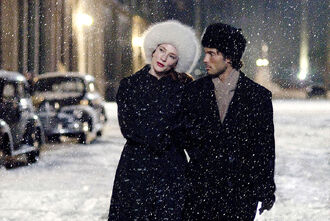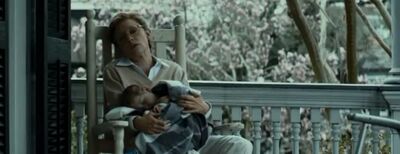
The Curious Case of Benjamin Button is a 2008 American romantic fantasy drama film directed by David Fincher.
The storyline by Eric Roth and Robin Swicord is loosely based on the 1922 short story of the same name by F. Scott Fitzgerald. The film stars Brad Pitt as a man who ages in reverse and Cate Blanchett as the love interest throughout his life.
The film was released in North America on December 25, 2008, and on February 6, 2009 in the United Kingdom, to positive reviews. The film went on to receive thirteen Academy Award nominations, including Best Picture, Best Director for Fincher, Best Actor for Pitt and Best Supporting Actress for Taraji P. Henson, and won three, for Best Art Direction, Best Makeup and Best Visual Effects.
- Directed by: David Fincher
- Produced by: Kathleen Kennedy, Frank Marshall, Ceán Chaffin
- Written by: Eric Roth, Robin Swicord
- Based on: "The Curious Case of Benjamin Button" by F. Scott Fitzgerald
- Starring: Brad Pitt, Cate Blanchett, Taraji P. Henson, Julia Ormond, Tilda Swinton
- Music by: Alexandre Desplat

The Curious Case of Benjamin Button Trailer HD
- Cinematography: Claudio Miranda
- Edited by: Kirk Baxter Angus Wall
- Country: United States
- Language: English
- Running time: 166 minutes
- Budget: $150 million
- Box Office: $334 million
- Release date: December 25, 2008
- Distributed by: Paramount Pictures, Warner Bros. Pictures
Plot[]
In 2005, elderly Daisy Fuller (Cate Blanchett) is on her deathbed in a New Orleans hospital accompanied and attended by her daughter, Caroline (Julia Ormond). Caroline is extremelly sad about the inminent loss of her mother.

Daisy tells Caroline the clockmaker story.
Daisy tells her daughter a history about the inaguration of the New Orleans train station in 1912. Daisy tells Caroline that she attended the inaguration ceremony and that the main clock of the station was going in reverse. The clockmaker who designed it, who lost his son at war, told at the inaguration that he decided to make the clock that way as a symbol for all the sons lost at war, and the desire of their parents to reverse time and have their sons standing up, coming back home again and living a great life.
Daisy then asks Caroline to read aloud from the diary of Benjamin Button that Daisy has in her suitcase at the hospital.
From the reading, we learn that on the evening of November 11, 1918, a boy is born with the appearance and physical maladies of an elderly man. The baby's mother died after giving birth, and the father, Thomas Button, abandons the infant on the porch of a nursing . Queenie and Mr. "Tizzy" Weathers, workers at the nursing home, find the baby, and Queenie decides to care for him as her own. Since then, Benjamin lives at the nursing home with her adopted mother Queenie and all the eldery residents.
While reading it, Caroline doesn't believe the story written but her mother asks her to continue reading the diary.
In 1925, Benjamin, at the age of 7 but with an aspect and illneses of an extremely eldery man, learns to walk and declares it a miracle, after which he uses crutches in place of a wheelchair. On Thanksgiving 1930, a less decrepit Benjamin at the age of 12 meets six-year-old Daisy, whose grandmother lives in the nursing home. He and Daisy become good friends since then, and they use to talk and play together at the nursing home.

Caroline reads in Benjamin Button's diary that he loved Daisy since the first time he saw her.
Caroline realizes then that the Daisy Benjamin is talking about in his diary is her mother.
Later, Benjamin accepts work on a tugboat captained by Mike Clark. Benjamin also meets Thomas Button at a burdel, who does not reveal that he is Benjamin's father. In Autumn 1936, Benjamin leaves New Orleans for a long-term work engagement with the tugboat crew; Daisy is saddened by Benjamin's departure and she makes him promise he will send her a postcard from wherever he goes. Daisy also promises to write him frecuently.

While she is in New York with her company, Daisy recieves a postcard from Benjamin.
Daisy is later accepted into a dance company in New York City under choreographer George Balanchine, and writes Benjamin, who's with captain Mike's crew, to tell him.
In 1941, Benjamin is in Murmansk, where he begins having an affair with Elizabeth Abbott, wife of the British Minister. In a postcard, Benjamin tells Daisy he's falling in love with Elizabeth.
That December, Japan attacks Pearl Harbor, thrusting the United States into World War II. Mike volunteers the boat for the U.S. Navy; the crew is assigned to salvage duties. During a patrol, the tugboat finds a sunken U.S. transport and the bodies of many American troops. A German submarine surfaces; Mike steers the tugboat full speed towards it while a German gunner fires on the tugboat, killing most of the crew, including Mike. The tugboat rams the submarine, causing it to explode, sinking both vessels. Benjamin and another crewman are rescued by U.S. Navy ships the next day.
In May 1945, Benjamin returns to New Orleans to the nursing home and reunites with Queenie. A few weeks later, Daisy cames to the nursing home to visit Queenie and finds Benjamin.

Daisy cames to the nursing house and meets Benjamin. She is amazed about how much younger Benjamin looks after so much years spaced.
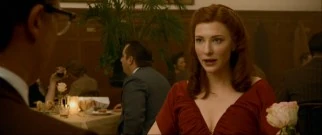
After they both meet again after so many years apart, Daisy and Benjamin have dinner together.
Benjamin and Daisy go out for dinner. Daisy still loves Benjamin and wants to spend the night with him, since she's going to New York the next day. But, upon failing to seduce Benajamin, who doesn't want a fling with her, after the dinner, Daisy departs.
Benjamin later reunites with Thomas Button, who, terminally ill, reveals he is Benjamin's father and wills Benjamin his button company and his estate.
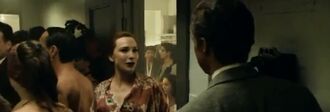
Daisy is suprised when Bejamin visits her in New York.
After his father's death, un 1947, Benjamin decides to go to New York to visit Daisy and to try to win back her love. Benjamin visits Daisy unannounced, and he departs upon seeing that she is not interested in him anymore and that she has fallen in love with someone else.
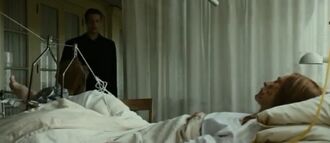
Bejamin visits Daisy at the hospital.
In 1954, Daisy's dancing career ends when her leg is crushed in an automobile accident in Paris. When Benjamin visits her, Daisy is amazed by his youthful appearance, but, frustrated by her injuries, she tells him to stay out of her life.
In spring 1962, Daisy returns recovered to New Orleans and reunites with Benjamin. Now of comparable physical age, they fall in love and star a romance.

Daisy tell Benjamin she's pregnant
The two go sailing together. They return to New Orleans to learn that Queenie has died
So then they move in together. In 1967, Daisy, who has opened a ballet studio, tells Benjamin that she is pregnant; she gives birth to a girl, Caroline, in the spring of 1968.
Believing he can not be a father to his daughter due to his reverse aging, Benjamin sells his belongings, leaves the proceeds to Daisy and Caroline, and departs the next spring; he travels alone during the 1970s.

One night Benjamin leaves Daisy and their daughter, and Daisy can't stop him or persuade him to stay

Daisy is thriller when Benjamin comes to visit her ballet studio after so many years.
Benjamin returns to Daisy, who's still in love with him, in 1980. Now married, Daisy is thrilled when he sees Benjamin after so many years. Daisy, now married, introduces him, as a family friend, to her husband and daughter. Daisy admits that he was right to leave; she could not have coped otherwise. She later visits Benjamin at his hotel, where they again share their passion for each other, then part once more.

Knowing that Benjamin has demetia, Daisy wants to take care if him for the rest of his life at the nursing home.
In 1990, widowed Daisy is contacted by social workers who have found Benjamin—now physically a pre-teen. When she arrives, they explain that he was living in a condemned building and was taken to the hospital in poor physical condition, and that they found her name in his diary. The bewildered social workers also say he is displaying early signs of dementia. Daisy moves into the nursing home in 1997 and cares for Benjamin for the rest of his life. In the spring of 2003, Benjamin dies in Daisy's arms, physically an infant but chronologically 84 years of age.
Daisy dies at the hospital as Hurricane Katrina approaches.
Cast[]

- Brad Pitt - Benjamin Button
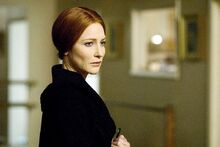
- Cate Blanchett - Daisy Fuller
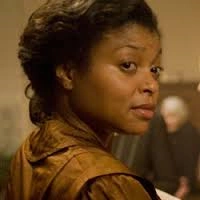
- Taraji P. Henson - Queenie

- Julia Ormond - Caroline Fuller

- Tilda Swinton - Elizabeth Abbott
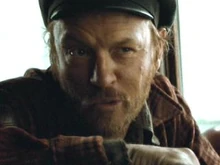
- Jared Harris - Captain Mike Clark
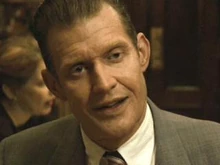
- Jason Flemyng - Thomas Button
- Mahershalalhashbaz Ali - Tizzy Weathers
- Edith Ivey - The woman who taught him to play piano"
- Rampai Mohadi - Ngunda Oti
Music[]
The score to The Curious Case of Benjamin Button was written by French composer Alexandre Desplat, who recorded his score with an 87-piece ensemble of the Hollywood Studio Symphony at the Sony Scoring Stage
Track listing:
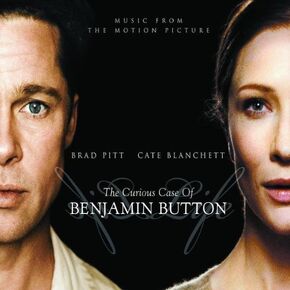
| 1. Postcards |
| 2. Mr. Gateau |
| 3. Meeting Daisy |
| 4. A New Life |
| 5. Love in Murmansk |
| 6. Meeting Again |
| 7. Mr. Button |
| 8. "Little Man" Oti |
| 9. Alone at Night |
| 10. It Was Nice to Have Met You |
| 11. Children's Games |
| 12. Submarine Attack |
| 13. The Hummingbird |
| 14. Sunrise on Lake Pontchartrain |
| 15. Daisy's Ballet Career |
| 16. The Accident |
| 17. Stay Out of My Life |
| 18. Nothing Lasts |
| 19. Some Things You Never Forget |
| 20. Growing Younger |
| 21. Dying Away |
| 22. Love Returns |
| 23. Benjamin and Daisy |
Production[]
In May 2000, Paramount Pictures hired screenwriter Jim Taylor to adapt a screenplay from the short story. The studio also attached director Spike Jonze to helm the project. Screenwriter Charlie Kaufman had also written a draft of the adapted screenplay at one point. In June 2003, director Gary Ross entered final negotiations to helm the project based on a new draft penned by screenwriter Eric Roth. In May 2004, director David Fincher entered negotiations to replace Ross in directing the film.
In May 2005, actors Brad Pitt and Cate Blanchett entered negotiations to star in the film. In September 2006, actors Tilda Swinton, Jason Flemyng and Taraji P. Henson entered negotiations to be cast into the film. The following October, with production yet to begin, actress Julia Ormond was cast as Daisy's daughter, to whom Blanchett's character tells the story of her love for Benjamin Button.
For Benjamin Button, New Orleans, Louisiana and the surrounding area was chosen as the filming location for the story to take advantage of the state's production incentives, and shooting was slated to begin in October 2006. Filming of Benjamin Button began on November 6, 2006 in New Orleans. In January 2007, Blanchett joined the shoot. Fincher praised the ease of accessibility to rural and urban sets in New Orleans and said that the recovery from Hurricane Katrina did not serve as an atypical hindrance to production.

Some filming was conducted in the Garden District of New Orleans, including this home at 2707 Coliseum St.
In March 2007, production moved to Los Angeles for two more months of filming. Principal photography was targeted to last a total of 150 days. Additional time was needed at visual effects house Digital Domain to make the visual effects for the metamorphosis of Brad Pitt's character to the infant stage. The director used a camera system called Contour, developed by Steve Perlman, to capture facial deformation data from live-action performances.
Several digital environments for the film were created by Matte World Digital, including multiple shots of the interior of the New Orleans train station, to show architectural alterations and deterioration throughout different eras. The train station was built as a 3D model and lighting and aging effects were added, using Next Limit's Maxwell rendering software—an architectural visualization tool. Overall production was finished in September 2007
Release[]

Cate Blanchett at the movie premiere in Los Angeles
The Curious Case of Benjamin Button was slated for theatrical release in December 25 in the United States, January 16, 2009 in Mexico, February 6 in the United Kingdom, February 13 in Italy and February 27 in South Africa.
On its opening day, the film opened in the number two position behind Marley & Me, in North America with $11,871,831 in 2,988 theaters with a $3,973 average. However, during its opening weekend, the film dropped to the third position behind Marley & Me and Bedtime Stories with $26,853,816 in 2,988 theaters with an $8,987 average. The film has come to gross $127.5 million domestically and $206.4 million in foreign markets, with a total gross of $333.9 million.
Reception[]
The film has received positive reviews, with Pitt's performance receiving praise. The review aggregator Rotten Tomatoes reports that 72% of critics gave the film positive reviews based on 235 reviews. According to Metacritic, the film received an average score of 70 out of 100, based on 37 reviews. Yahoo! Movies reported the film received a B+ average score from critical consensus, based on 12 reviews.
Todd McCarthy of Variety magazine gave the film a positive review, calling it a "richly satisfying serving of deep-dish Hollywood storytelling." Peter Howell of The Toronto Star says: "It's been said that the unexamined life is not worth living. The Curious Case of Benjamin Button suggests an addendum: a life lived backwards can be far more enriching" and describes the film as "a magical and moving account of a man living his life resoundingly in reverse" and "moviemaking at its best." Rod Yates of Empire awarded it five out of a possible five stars. Kirk Honeycutt of The Hollywood Reporter felt the film was "superbly made and winningly acted by Brad Pitt in his most impressive outing to date." Honeycutt praised Fincher's directing of the film and noted that the "cinematography wonderfully marries a palette of subdued earthern colors with the necessary CGI and other visual effects that place one in a magical past." Honeycutt states the bottom line about Benjamin Button is that it is "an intimate epic about love and loss that is pure cinema."
A. O. Scott of The New York Times states: "The Curious Case of Benjamin Button, more than two and a half hours long, sighs with longing and simmers with intrigue while investigating the philosophical conundrums and emotional paradoxes of its protagonist’s condition in a spirit that owes more to Jorge Luis Borges than to Fitzgerald." Scott praised director David Fincher and writes "Building on the advances of pioneers like Steven Spielberg, Peter Jackson and Robert Zemeckis, Mr. Fincher has added a dimension of delicacy and grace to digital filmmaking" and further states: "While it stands on the shoulders of breakthroughs like Minority Report, The Lord of the Rings and Forrest Gump, Benjamin Button may be the most dazzling such hybrid yet, precisely because it is the subtlest." He also stated: "At the same time, like any other love--like any movie--it is shadowed by disappointment and fated to end." On the other hand, Anne Hornaday of The Washington Post states: "There's no denying the sheer ambition and technical prowess of The Curious Case of Benjamin Button. What's less clear is whether it entirely earns its own inflated sense of self-importance" and further says, "It plays too safe when it should be letting its freak flag fly." Kimberley Jones of the Austin Chronicle panned the film and states, "Fincher's selling us cheekboned movie stars frolicking in bedsheets and calling it a great love. I didn't buy it for a second."
Roger Ebert of the Chicago Sun-Times gave the film two and a half stars out of four, saying that it is "a splendidly made film based on a profoundly mistaken premise." He goes on to elaborate that "the movie's premise devalues any relationship, makes futile any friendship or romance, and spits, not into the face of destiny, but backward into the maw of time." Peter Bradshaw in The Guardian called it "166 minutes of twee tedium", giving it one star out of a possible five.
Cosmo Landesman of the Sunday Times wrote: "The film's premise serves no purpose. It's a gimmick that goes on for nearly three hours," concluding "The Curious Case of Benjamin Button is an anodyne Hollywood film that offers a safe and sanitised view of life and death. It's Forrest Gump goes backwards," while awarding the film two out of five stars. James Christopher in The Times called it "a tedious marathon of smoke and mirrors. In terms of the basic requirements of three-reel drama the film lacks substance, credibility, a decent script and characters you might actually care for" while Derek Malcolm of London's Evening Standard notes that "never at any point do you feel that there's anything more to it than a very strange story traversed by a film-maker who knows what he is doing but not always why he is doing it.
Awards[]
Wins:[]
- Academy Awards: Best Art Direction (Donald Graham Burt, Victor J. Zolfo), Best Makeup (Greg Cannom), Best Visual Effects (Eric Barba, Steve Preeg, Burt Dalton, Craig Barron)
- BAFTA'S: Best Makeup & Hair, Best Production Design, Best Visual Effects
- Austin Film Critics Association Awards: Best Supporting Actress (Taraji P. Henson)
- Central Ohio Film Critics Association Awards: Best Score (Alexandre Desplat)
- Houston Film Critics Society Awards: Best Picure, Best Cinematography (Claudio Miranda)
- Las Vegas Film Critics Society Awards: Best Art Direction, Best Cinematography (Claudio Miranda), Best Costume Design (Jacqueline West)
- London Film Critics' Circle: Director of the Year (David Fincher), Best Supporting Actress of the Year (Tilda Swinton)
- National Board of Review: Best Director (David Fincher), Best Adapted Screenplay (Eric Roth)
- Saturn Awards: Best Fantasy Film, Best Supporting Actress (Tilda Swinton)
- St. Louis Gateway Film Critics Association Awards: Best Film
- Vancouver Film Critics Circle Awards: Best Director (David Fincher)
- Washington D.C. Area Film Critics Association: Best Art Direction
Nominations:[]
- Academy Awards: Best Picture (Kathleen Kennedy, Frank Marshall, Ceán Chaffin), Best Director (David Fincher), Best Actor (Brad Pitt), Best Supporting Actress (Taraji P. Henson), Best Adapted Screenplay (Eric Roth), Best Film Editing (Kirk Baxter, Angus Wall), Best Costume Design (Jacqueline West), Best Cinematography (Claudio Miranda), Best Original Score (Alexandre Desplat), Best Sound Mixing (David Parker, Michael Semanick, Ren Klyce, Mark Weingarten)
- Golden Globe Awards:Best Motion Picture – Drama, Best Actor - Motion Picture Drama (Brad Pitt), Best Director (David Fincher), Best Screenplay (Eric Roth), Best Original Score (Alexandre Desplat)
- BAFTA'S: Best Film (Kathleen Kennedy, Frank Marshall, Ceán Chaffin), Best Director (David Fincher), Best Adapted Screenplay (Eric Roth), Best Actor (Brad Pitt), Best Costume Design, Best Music (Alexandre Desplat), Best Cinematography (Claudio Miranda), Best Editing
- Screen Actors Guild Awards: Best Leading Actor (Brad Pitt), Best Supporting Actress (Taraji P. Henson), Best Cast
- Broadcast Film Critics: Best Film, Best Actor (Brad Pitt), Best Actress (Cate Blanchett), Best Director (David Fincher), Best Supporting Actress (Taraji P. Henson), Best Cast, Best Screenplay (Eric Roth), Best Composer (Alexandre Desplat)
- American Society of Cinematographers: Outstanding Achievement in Cinematography in Theatrical Releases (Claudio Miranda)
- Writers Guild of America Awards: Writers Guild of America Award for Best Adapted Screenplay (Eric Roth, Robin Swicord)
- Chicago Film Critics Association: Best Picture, Best Director (David Fincher), Best Adapted Screenplay (Eric Roth), Best Cinematography (Claudio Miranda), Best Orinal Score (Alexandre Desplat)
- Directors Guild of America Awards: Outstanding Directorial Achievement in Motion Pictures (David Fincher)
- Houston Film Critics Society Awards: Best Director (David Fincher), Best Actor (Brad Pitt), Best Actress (Cate Blanchett), Best Supporting Actress (Taraji P. Henson), Best Screenplay (Eric Roth), Best Score (Alexandre Desplat)
- London Film Critics' Circle: Best Film, Screenwriter of the Year (Eric Roth)
- MTV Movie Awards: Best Female Performance (Taraji P. Henson)
- Satellite Awards: Best Adapted Screenplay (Eric Roth, Robin Swicord), Best Art Direction and Production Design (Donald Graham Burt, Tom Reta), Best Cinematography (Claudio Miranda), Best Costume Design (Jacqueline West)
- Saturn Awards: Best Actor (Brad Pitt), Best Actress (Cate Blanchett), Best Director (David Fincher), Best Writing (Eric Roth), Best Music (Alexandre Desplat), Best Visual Effects
- Scream Awards: Best Fantasy Actor (Brad Pitt).



